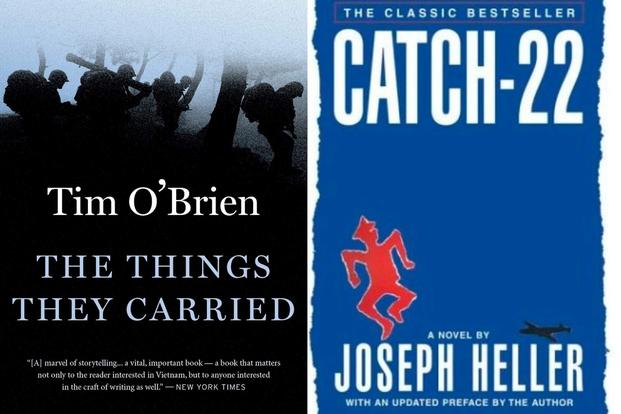The Matanuska-Susitna Borough School District school board, headquartered in Palmer, Alaska has banned teachers from assigning Tim O'Brien's Vietnam War classic "The Things They Carried" and Joseph Heller's World War II satire "Catch-22" for their high school English classes.
The books are included on a somewhat random-seeming list of dangerous books that also includes F. Scott Fitzgerald's "The Great Gatsby," Maya Angelou's "I Know Why the Caged Bird Sings" and Ralph Ellison's "The Invisible Man."
The vote wasn't even close, with the board voting 5-2 to rid the curriculum of the offending literature. The books will remain in the school library, and Mat-Su School Board President Tom Bergey defended the action as "not a full ban," according to local news reports.
The district includes the town of Wasilla, Alaska, home of Sarah Palin, the former Alaska governor and one-time candidate for vice president. The borough covers a land mass approximately the size of Vermont and includes about 110,000 residents, about 15% of the state's population. Alaska’s governor, Mike Dunleavy, served as the school board president from 2010 and 2012.
Let's talk about "The Things They Carried." Tim O'Brien's 1990 collection of short stories about troops on the ground in Vietnam is one of the great works of 20th century fiction, a book that perfectly captures the brotherhood and sacrifice of military service and the contradictions introduced when troops are asked to fight without a clear objective.
It's those contradictions that make "The Things They Carried" such important reading for high schools students. In addition to being a brilliant portrayal of collective enterprise and sacrifice, the book lets young adults know that not every problem has a solution and that most situations aren't really black-and-white choices.
The book has (thankfully) replaced Stephen Crane's "The Red Badge of Courage" on most reading lists and gives young people a war story that might connect to their own lives.
So what's the problem with "The Things They Carried," according to a description provided by the school district? "Profanity and sexual references."
Yes, please. Let's protect the young men and women we're trying to recruit to military service from reality. Does the book include more than a few MF-bombs? Well, yeah. But, seriously, there aren't many 16-year-olds who will be surprised by that word and every single future veteran (and cop and first responder) will come to know that word like they know their own names.
"Catch-22" is written by a veteran and, admittedly, doesn't treat the Greatest Generation with the same reverence that Tom Brokaw made a million dollars selling to America back in the 1990s.
But Joseph Heller’s 1961 book takes the absurdities built into the military's chain of command and inflates them into a satire that's both hilarious and discomfiting. Were WWII troops plagued by more than a few nonsense orders from clueless officers who had been selling cars or teaching chemistry before the war started? Definitely.
"Catch-22" is a great book for teaching kids about satire, social commentary and the basic concept of learning greater respect for an institution through critical evaluation. The book has survived as a classic and spawned both a 1970 movie and a 2019 Hulu TV series.
So what's the problem with "Catch-22," according to the school district? "There are a handful of racial slurs, the characters speak with typical 'military men' misogyny and racist attitudes of the time. There are scenes of violence both hand to hand and with guns, and violence against women."
Who could imagine a military novel shouldn't feature both violence and guns? And, leaving aside the fact that the racism and misogyny in "Catch-22" is used to negatively portray the characters who display those traits, why deny students the opportunity to learn how attitudes have evolved since World War II.
Let's be real: The actual issue here is that both books portray authority figures as flawed and often downright wrong. A mature reading of each author teaches the idea that institutions can be respected despite (and even because) of their weaknesses and that loyalty and clear thinking can be their own rewards.
The teachers' union in Alaska feels pretty much the same way, according to local news reports.
"This is a blatant effort to curtail critical thinking, stifle discussion, and deprive our students of the opportunity to share, as a class, the experience of studying some of the most classic American literature," Matanuska-Susitna Education Association President Dianne K. Shibe said to the Anchorage Daily News. And since the ban, a Palmer city council member has started publicly reading her way through "The Things They Carried" each day via Facebook live.
Just for reference, the district also removed "The Great Gatsby, " a book taught for generations without incident in even the most conservative backwaters of the United States, for its "language and sexual references."
Still, let's focus on the real outrage here. "The Things They Carried" is a book that teaches respect for military service in general and the sacrifices of Vietnam veterans in particular.
Do its stories explore the ambiguities of that era? Absolutely, but it's through those ambiguities that Tim O'Brien truly honors the spirit of the men who fought that war.
Alaska's population has the largest percentage of veterans per capita in the country at about 12%. Let's hope they can rise up and educate the educators and get these books returned to the curriculum ASAP.
Keep Up With the Best in Military Entertainment
Whether you're looking for news and entertainment, thinking of joining the military or keeping up with military life and benefits, Military.com has you covered. Subscribe to the Military.com newsletter to have military news, updates and resources delivered straight to your inbox.















